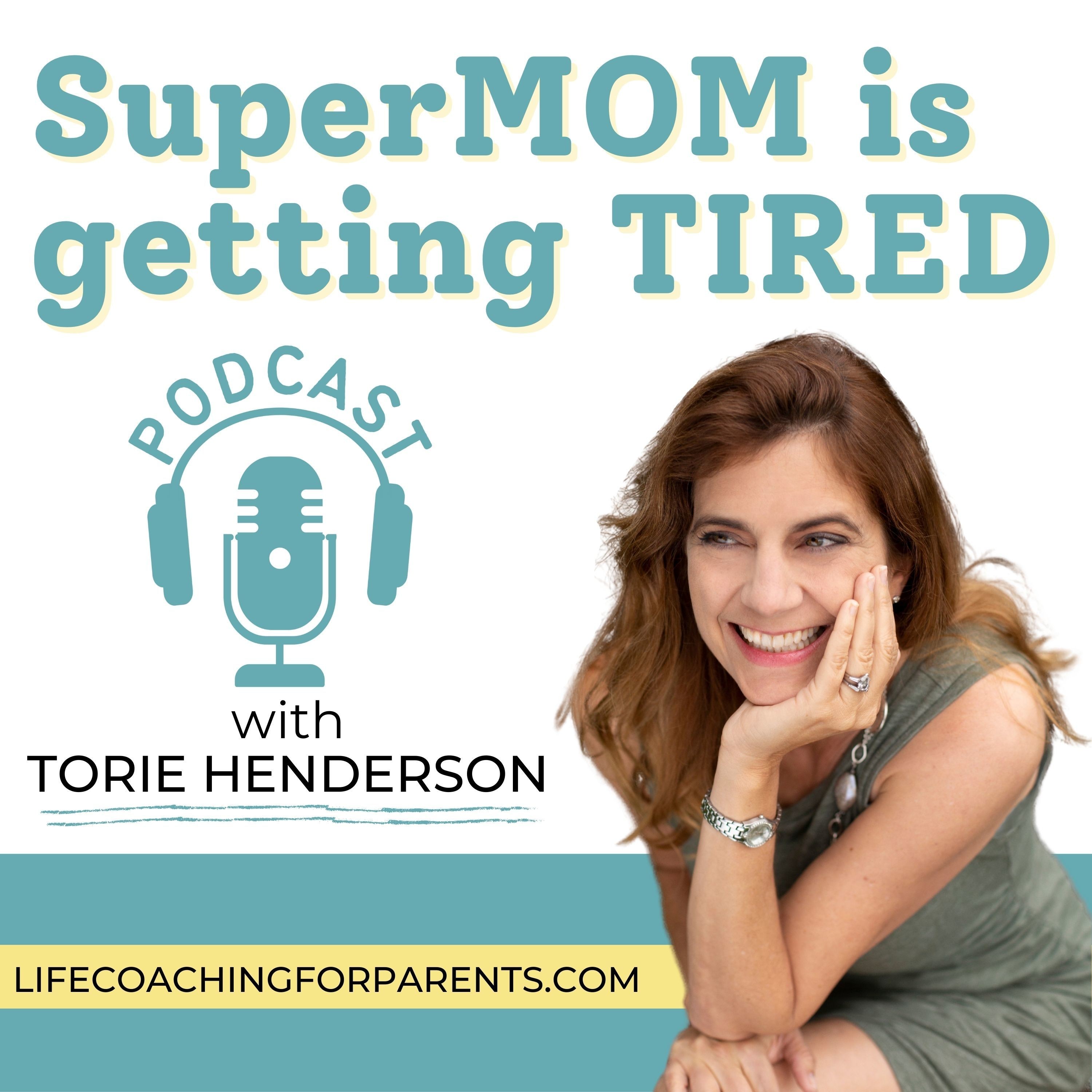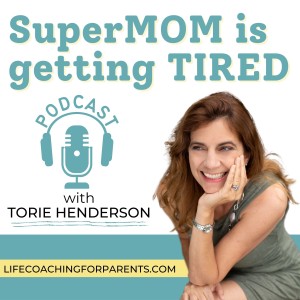
75K
Downloads
173
Episodes
You love being a mom but get overwhelmed, lost and resentful by all the parenting responsibilities. Listen as life coach, teacher and parent educator, Torie Henderson, answers common parenting dilemmas from hard working Supermoms. Are you exhausted from working hard all day but still feel like you haven’t accomplished anything? Do you want to feel calm, energized and in control? Then this podcast is for you.
Episodes

Tuesday Nov 05, 2019
What if you don't like your kid?
Tuesday Nov 05, 2019
Tuesday Nov 05, 2019
Episode 44: What if you don’t like your kid?
“My daughter is a pre-teen, and already immersed in puberty and the mood swings and irritability that goes with it. Getting her to do anything is a battle: homework, chores, coming to the table to eat, putting her device away, going to bed, you name it. It takes every ounce of patience I have to get through the week with her. By the time the weekend rolls around, I. AM. DONE.
This weekend, as my husband is heading out the door, he says to me: “Don’t let her sit on her phone and watch youtube all day. Find something fun the two of you can do together.”
It sounds like a great idea. I used to love being around her and would like nothing more than to have something fun we both enjoy doing. The problem is, she doesn’t like doing anything I like and when I try, it becomes another battle. She complains, argues, insults, and criticizes everything I do. I would not want to spend time with anyone who treats me this way. I love my daughter, but she treats me like the enemy.
I feel so guilty, but I really don’t like my being around my pre-teen right now.”
Parent Educator Answer:
From a parent educator perspective, nothing has gone wrong here. The situation you are describing is exactly what is supposed to happen.
Pre-teens are supposed to start separating from their parents, especially their moms. Mother-daughter identities get enmeshed with each other. We feel proud when our child excels, we feel happy when they are happy and sad when they are sad.
Does your child ever get embarrassed by your behavior?
“OMG Mom, you are not going to wear that.”
“Don’t you dare dance or sing in the car, EVER.”
Have you ever been embarrassed by your child’s behavior?
“Don't talk to your friend like that! She was trying to be nice.”
“Your grandma is coming over so please be on your best behavior and for God’s sake, clean up your mess before she arrives!”
These are signs of enmeshment, where our ego identifies with our child's behavior and vice versa.
Teens and tweens will criticize, insult, argue and reject our ideas as a way to individuate. It’s a sign that your daughter is ready to see herself as different, unique and competent. Through bickering, girls can affirm that they are separate individuals from their mom with their own tastes, personalities and preferences.
It is developmentally normal for pre-teens to reject family activities or parental ideas of fun, (unless a friend can come along with them). When they reject our suggestions of fun things to do, it’s as though they are saying “I’m not a baby anymore”.
Child development experts suggest holding tight to participation in family activities such as holiday dinners with grandparents, going to church, chores and other family rituals. Let them complain and argue all they want but hold tight to these things.
You cannot make your child be nice or enjoy spending time with you.
Instead, encourage them to develop a “group identity” separate from you. Many tweens will do this naturally by adopting a best friend or tight group where they dress alike, talk alike and do everything together.
These days, group identity can take place online. Following certain youtubers or facetiming with friends helps the tween feel safe while learning to stand on her own. Tweens benefit from a transitional bridge between being one with their family, and feeling confident enough to be independent.
When we see our kids rejecting our ideas of fun to sit on their phones all day, we see it as a terrible waste of time. But when kids play online games, facetime, you tube, netflix, vsco, and tic toc, it’s really more about understanding the culture of their peers, identifying as someone who is socially “in the know”, and exploring interests separate from mom.

Life Coaching Answer: What gets in our way from viewing this as normal tween behavior?
The circumstance you described is completely neutral. But it doesn’t feel neutral because of what you are making it mean. You feel guilty so you must be making it mean something like, “Something is wrong with me", "I’m a bad mom". "If I were nice, I would like her." "I should want to be around her." or "She shouldn’t want to be on her phone all day.”
Notice how you feel when you think these? Guilty. Awful. Heavy.
How do you parent when you feel terrible? You suck it up. Try harder. Get annoyed with yourself and her.
When we feel guilty and annoyed, we tend to parent inconsistently and have trouble sticking to rules around phone time and family obligations.
What is the result of parenting this way? You feel like a terrible parent. This reinforces your belief that you are doing it wrong and you are a terrible person.
In order to see your daughter’s behavior as normal and a sign of healthy social development, you’d have to give up the belief that you are bad and wrong.
Sometimes we hold onto beliefs like “I’m bad” or “I’m not a nice person” as a way to motivate ourselves to be better.
It’s like this: “At my core, I’m bad and mean. I need to remind myself of this in order to motivate myself to be nice.”
This might work for a little while but the long term effect of this is exhaustion and irritability.
You don’t like being around someone who complains, criticizes, argues and insults you, SO WHAT? Let’s imagine for a minute that you didn’t think this was a problem. If you believed that you were a good person, and felt neutral about your daughter's behavior, what do you think you might do?
You certainly wouldn’t let your husband’s parting comment bother you. You’d probably leave her alone, which it sounds like is what she’s wanting. You might drop her at a friend’s house and enjoy your own company, guilt free.
If you believed, at your core, that you were a kind and loving mother. You would look for ways to prove yourself right. This might involve paying attention to your own needs. Spending time with people who uplift you instead of insult you. It might mean cooking her food or buying her a gift or whatever felt kind and loving to you.
Believing we are kind and loving, makes us act kind and loving. No guilt. No drama. Just unconditional love. Where your pre-teen can say or do anything and it doesn't take you away from feeling loving.
Supermom Kryptonite: Motivating yourself out of negative emotion
Many of us use negative emotion to motivate ourselves to do something. We think telling ourselves “I’m a bad person” will make us act nice.
We used this in school: We'd tell ourselves we’re going to flunk a class to motivate us to study for a test.
We want to lose weight so we tell ourselves how fat and lazy we are in order to motivate us to exercise. We think this will make us go to the gym and eat healthy, and it might once or twice, but over time it just makes us feel bad about ourselves. Even if we do lose weight, we don’t feel any better because we are still thinking mean things about ourselves. What’s the point of losing weight if you feel terrible either way?
Motivating yourself with negative emotion will give you a negative result. Telling yourself, “I’m going to flunk if I don’t study” might get you a good grade but it will increase your stress and make you dislike school.
Believing, “I’m a bad person if I don’t like spending time with my ornry pre-teen” might motivate you to make an effort and do things together, but leave you feeling guilty and resentful.
When we motivate ourselves out of positive emotion, it's easy to keep going. We don't get burned out or resentful because feeling good is it's own reward.
Supermom Powerboost: Liking your own child.
Of course we all want to like our own children. But sometimes the best way for us to do this is to not be around them so much. When my son was 13, I used to think maybe there was a reason families would send their 13 year olds off to apprentice for an uncle. I would love to send my daughter to be a live in nanny for another family so she can be more appreciative of what she has and learn some skills.
My husband pointed out that I always talked about having another baby when we were away from our children for the weekend. Apparently, I never mentioned at the end of an exhausting day!
What thoughts can you think about living with an ornery teen, that help you feel like a kind and loving mom? I would start with
“I love her, but I don’t enjoy this phase and that’s ok.” or "I'm not supposed to like this behavior."
How much time can you spend with your child and still think kind thoughts? It may be easier to like her when you aren’t spending so much time together. Certainly it’s easier to like her when you aren’t telling yourself that she shouldn’t be doing what she’s doing, and you shouldn’t be feeling what your feeling.
You don’t want to convince yourself something is true if you don’t believe it. If you say, “I love this phase of her life” and that feels like a lie, it will not work. We want to think something that feels true and gives us a softening feeling in the body. “I don’t like her and that’s ok” “I’m prioritizing my emotional well being over her screen time, and that’s ok.” “I’m a good, but imperfect mother.”
Quote of the Day:
“‘It is what it is’ This means we parent our children as our children are, not as we might wish them to be.” Dr. Shafali Tsaberry

No comments yet. Be the first to say something!